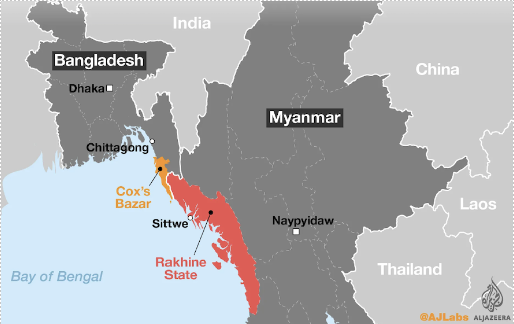Stateless and Silenced - the Rohingya Refugee Crisis
- Isabel Vodrazka de Miranda
- Nov 4, 2024
- 3 min read
Fleeing from decades of persecution in Myanmar, Rohingya people remain tragically oppressed and silenced. The Rohingya have faced unspeakable atrocities, including rape, mass burning of villages, and murder. As the UN has confirmed, this ethnic cleansing has left thousands of civilians in limbo, fighting to survive but also defend their beliefs and morals.
For the past 50 years, they have been ignored, marginalised, and repressed, by the same institutions that are meant to help them. It is clear then that this direct violation of human rights is of the utmost importance, which raises an even greater question: how is an atrocity of this level so far from headlines? How have we allowed it to go on for so long? Maybe after the 50 years of repression it would be easy to forget about it, but when we witness 7 long years of continuous genocide, how can we stand by helpless?

Who are the Rohingya? Rohingya is an ethnic minority that has lived for centuries in Myanmar, especially in the Rakhine state (one of the poorest regions). Despite not being the only Muslim group there, (for example the Burmese is a larger also predominantly Muslim group actively recognised by the Myanmar state), they have historically been seen as a threat and have then faced discrimination by the state and its population.
Truly, this conflict has existed since WWII, when Rakhine Buddhists supported the Japanese forces while the Rohingya population stood with the British troops. This initial clash in opinions has since then been growing, multiplying, silently but deadly.
In 1962, the successful coup d’état against the previous governmental power put Burmese soldiers in power, who in turn promoted fierce nationalism. Before this successful overthrow of the government (1949) all citizens, including the Rohingya, were being issued registration cards. However, with this different force in power, and due to the new constitution implemented, their cards started being stolen from them. By forcing Rohingya to accept “National Verification Cards, they essentially become foreigners, illegal immigrants of their own country, they became stateless.
Eventually, a governmental operation called Dragon King was created (1978) which forcefully displaced about 200,000 Rohingya that fled to Bangladesh and surrounding area.
In 1982, the Citizen Act recognised 135 ethnic group, but never Rohingya. This meant they could not be given citizenship, as they were not seen as equal members of this community, despite their historical significance. Rohingya people were then officially seen as less than, and have, since then, had no basic rights and protection, as well as being much more susceptible to abuses and injustices.
Still, another operation, titled “clean and beautiful nation” in 1991once again forced about 250,000 Rohingya members to flee.
Keeping in mind that “international law prohibits any form of forced displacement” (UNHCR), and that such forced displacement encompasses individual’s need to move, to avoid armed conflict, human rights violations or being forcefully evicted from their homes, how can a country’s government be able to pass such laws, operations, or plans, without any sort of punishment? Despite the “clean and beautiful nation operation” having been deemed by human rights watch an ethnic cleansing campaign, repercussions were evidently minimal, as they persisted and to this day the government still maintains this unjust treatment of Rohingya members.
The main conflict started later, despite these brewing forces having always been at the core of the relationship between the two, the Myanmar government and the Rohingya minority. In 2014, Violence broke out when four Muslim men were accused of raping 1 Buddhist women, which resulted in Buddhist nationalists (backed by security forces) to attack Muslim neighbourhoods, burning homes and displacing tens of thousands of Rohingya.
In 2016, Arakan Rohingya Salvation Army (ARSA) emerged and planned small scale attacks on border police stations which took place on the 25th of August 2017, killing 17 police officers. It also became the tipping point, sparking the current crisis as the state retaliated brutally.
Since 2017, over 350 villages have been burned, and around 10,000 men, women, children were killed as of last 2023.
For the past seven years, Rohingya have risked everything, fleeing by foot or any means necessary, uprooting their whole lives in search for salvation from the monstrous crimes they are facing in Myanmar. Many ended in Bangladesh refugee camp “Kutupalong” in Cox Bazar’s, now the largest refugee settlement in the world. The poor conditions of living and susceptibility of flooding inside these cramped camps has got nothing to do with the conditions all were forced to endure back home, where they watched their homes burn, as well as, reportedly, children and family members burned alive, women and children being raped, and other unimaginable heinous crimes against this community.





Comments